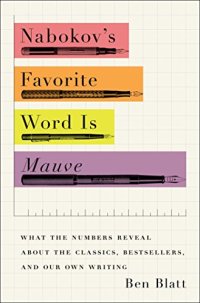
Ebook: Nabokov’s Favorite Word Is Mauve: What the Numbers Reveal About the Classics, Bestsellers, and Our Own Writing
Author: Ben Blatt
- Tags: Humor, Business & Professional, Cats Dogs & Animals, Comedy, Computers & Internet, Cooking, Doctors & Medicine, Essays, Hunting & Fishing, Jokes & Riddles, Lawyers & Criminals, Limericks & Humorous Verse, Love Sex & Marriage, Parenting & Families, Parodies, Political, Puns & Wordplay, Religion, Rural Life, Satire, Science & Scientists, Self-Help & Psychology, Sports, Theories of Humor, Urban Legends, Humor & Entertainment, Math Games, Puzzles & Games, Humor & Entertainment, Criticism & Theory, History & Criticism, Literatur
- Year: 2017
- Publisher: Simon & Schuster
- Language: English
- epub
What are our favorite authors’ favorite words? Which bestselling writer uses the most clichés? How can we judge a book by its cover?
Data meets literature in this playful and informative look at our favorite authors and their masterpieces.
“A literary detective story: fast-paced, thought-provoking, and intriguing.” —Brian Christian, coauthor of Algorithms to Live By
There’s a famous piece of writing advice—offered by Ernest Hemingway, Stephen King, and myriad writers in between—not to use -ly adverbs like “quickly” or “fitfully.” It sounds like solid advice, but can we actually test it? If we were to count all the -ly adverbs these authors used in their careers, do they follow their own advice compared to other celebrated authors? What’s more, do great books in general—the classics and the bestsellers—share this trait?
In Nabokov’s Favorite Word Is Mauve, statistician and journalist Ben Blatt brings big data to the literary canon, exploring the wealth of fun findings that remain hidden in the works of the world’s greatest writers. He assembles a database of thousands of books and hundreds of millions of words, and starts asking the questions that have intrigued curious word nerds and book lovers for generations: What are our favorite authors’ favorite words? Do men and women write differently? Are bestsellers getting dumber over time? Which bestselling writer uses the most clichés? What makes a great opening sentence? How can we judge a book by its cover? And which writerly advice is worth following or ignoring?
Blatt draws upon existing analysis techniques and invents some of his own. All of his investigations and experiments are original, conducted himself, and no math knowledge is needed to understand the results. Blatt breaks his findings down into lucid, humorous language and clear and compelling visuals. This eye-opening book will provide you with a new appreciation for your favorite authors and a fresh perspective on your own writing, illuminating both the patterns that hold great prose together and the brilliant flourishes that make it unforgettable.
Data meets literature in this playful and informative look at our favorite authors and their masterpieces.
“A literary detective story: fast-paced, thought-provoking, and intriguing.” —Brian Christian, coauthor of Algorithms to Live By
There’s a famous piece of writing advice—offered by Ernest Hemingway, Stephen King, and myriad writers in between—not to use -ly adverbs like “quickly” or “fitfully.” It sounds like solid advice, but can we actually test it? If we were to count all the -ly adverbs these authors used in their careers, do they follow their own advice compared to other celebrated authors? What’s more, do great books in general—the classics and the bestsellers—share this trait?
In Nabokov’s Favorite Word Is Mauve, statistician and journalist Ben Blatt brings big data to the literary canon, exploring the wealth of fun findings that remain hidden in the works of the world’s greatest writers. He assembles a database of thousands of books and hundreds of millions of words, and starts asking the questions that have intrigued curious word nerds and book lovers for generations: What are our favorite authors’ favorite words? Do men and women write differently? Are bestsellers getting dumber over time? Which bestselling writer uses the most clichés? What makes a great opening sentence? How can we judge a book by its cover? And which writerly advice is worth following or ignoring?
Blatt draws upon existing analysis techniques and invents some of his own. All of his investigations and experiments are original, conducted himself, and no math knowledge is needed to understand the results. Blatt breaks his findings down into lucid, humorous language and clear and compelling visuals. This eye-opening book will provide you with a new appreciation for your favorite authors and a fresh perspective on your own writing, illuminating both the patterns that hold great prose together and the brilliant flourishes that make it unforgettable.
Download the book Nabokov’s Favorite Word Is Mauve: What the Numbers Reveal About the Classics, Bestsellers, and Our Own Writing for free or read online
Continue reading on any device:

Last viewed books
Related books
{related-news}
Comments (0)